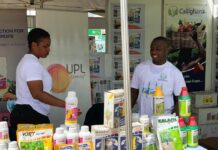Honey is one of the most demanded commodities on the international market with high nutrient value and huge economic benefits. Ghana produces a lot of honey for the international market, especially for the EU market but, there is no policy framework regulating apiculture activities. This has enabled delisting Ghana from the EU making, meaning banning Ghana from selling her honey to the EU market leading to the bemoaning of honey producers after production.
To enhance quality honey production to bring Ghana back to the EU market, the Ministry of Food and Agriculture and the Chamber of Agribusiness Ghana have called on the Food and Agriculture Organization of the United Nations to support the interventions to formulate policies to strengthen the sector.
During the call, the CEO of the Chamber of Agribusiness Ghana, Farmer Anthony Morrison revealed that apiculture is the second economic activity for several women in the agroforestry and plantations centers in the country. Although the hives are owned by the men, the women are given the opportunity to take care of the hives serving as a socio-economic activity for the women.
Irrespective of the several interventions that the private sector is putting in place to improve the apiculture sector in Ghana, there are three key issues that need to be addressed.
According to the CEO, Ghana does not have a policy strategy on apiculture development, secondly, how the private sector can bring innovation into the honey industry especially the movement of honey in terms of traceability and lastly to inculcate the school children into the industry in the form of providing hives for the various school vegetations.
Farmer Morrison bemoaned that likewise the cocoa industry where most of the cocoa farmers have not tasted chocolate before, most people at the honey producing communities have not tasted honey before, however, the private sector want to package honey in smaller economic pack to enhance the availability of honey to those at the disadvantage communities.
“Honey is a low handing fruit that can actually impact the socio-economic lives of many people in our rural areas, but we need such a driver as policy to help guide our operations so that all of us; the government, private and state agencies would have some form of direction and work together to make sure the sector is developed”, Dr. Courage Besa-Adanu, the convenor, Make Ghana Honey Fit for Local and Export project said.
He acknowledged the interventions that have taken place for the past years by the Agric Ministry, FAO and other non-governmental organizations, yet to actualize a holistic industry with all the organs functioning properly, there should be a policy that touches on how the various aspects of the value chain need to be developed.
He underscored the improvement made by the private sector to lift the face of apiculture when the Chamber of Agribusiness Ghana in partnership with other private organizations trained about four hundred and fifty people within two years with the support from QSI and GIZ.
The training has enhanced the formation and strengthening of associations within the apiculture industry with common voice, aims and objectives to protect the interest of the beekeepers and improve the quality of honey in Ghana.
The Chamber, and the private sector are very optimistic to alleviate the issues in the industry by training about thousand beekeepers, and the value chain actors in the year ahed.
Mentioning some of the interventions by the private sector, Dr. courage said, “in terms of the private sector, what we are trying to do is to streamline the apiculture sector in terms of traceability system and the traceability system is rapt in various tools, but the tools we are using right now is collective marketing”.
“Been sponsored by GIZ we are trying to develop a common code of practice manual for the sector where those who want to market in premium market both in Ghana and abroad could use that as a vehicle to get to those market, so if FAO can help us to put a strong policy together that would curtail all forms of irregularities and have a common direction for all the stakeholders to know its responsibilities to ensure that the various structures that are needed are put in place”, he added.
Dr. Dennis Owusu Adjei from the Animal Protection Directorate of the Ministry of Food and Agriculture said beekeeping is a livelihood support for the farmers during cocoa off season and forest conservation.
The Ministry is critical in supporting the apiculture sector to develop. However, with the engagement of FAO and the private sector policies could be drafted and sustained.
In response, the Food and Agriculture Organization of the United Nations assured to give its support to the good interventions that the government and the stakeholders would take to strengthen Ghana’s apiculture to improve food safety.
The Deputy Regional Representative for Africa and FAO Representative to Ghana, Yurdi Yasmi commended the team for such a remarkable step to strengthen the country’s apiculture to enhance food safety.
He acknowledged the existing activities of the stakeholders like GIZ, Olam and FAO to the development of Ghana’s apiculture.
FAO provides technical support unlike the World Bank and African Development Bank, FAO is not a funding agency but a technical agency of the United Nations, however, the organization could assist to look for funds. `








